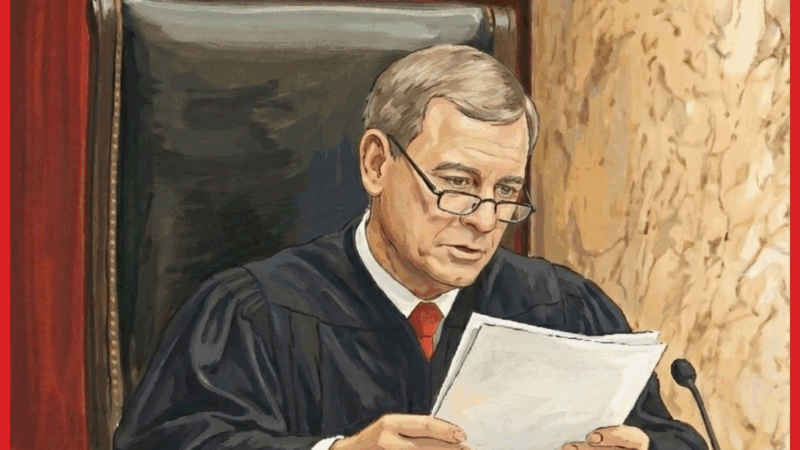Sewer Overflows Persist Despite Billions Spent
Every few weeks, Nelson Brooke drives through Jefferson County to check on the spots where the sewer overflows. Brooke is the head of the environmental group Black Warrior Riverkeeper.
At a stop, ten blocks west of downtown Birmingham, Brooke checks on Valley Creek. The water should be clear, but on this day, it looks more like broccoli soup.
“That kind of green-grey, milky cloudiness is a very common thing when you have sewage in water,” Brooke said.
He says it’s been this way for more than a decade. County officials say they don’t know where the sewage is coming from.
Later on his patrol, Brooke knocks on doors to see if residents know of sewage problems in their neighborhoods. Across the street, a young man calls out to ask if Brooke is lost.
“Do you know about sewer overflows?” Brooke asks the man. “Where sewage is coming out of manholes?”
Michael Alexander points to a slope in the street. “That’s right here,” he said. “When it rains on this street [sewage] comes out here here and here.”
Alexander, 37, has lived on this block since he was a kid. He says for nearly 30 years the sewer has been overflowing into the street.
“Every time it rains, the sewage comes up out of there and you can’t walk across [the road],” Alexander said. “You splash your car through there, you are going to have crap on your [tires]. You might have a tampon hanging off.”
Alexander makes a face. “The smell is terrible,” he said. “It’s like that for two blocks.”
Alexander says he and his neighbors have just learned to live with it.
A Long Running Problem
In 1993 local environmental groups sued Jefferson County which resulted in the Environmental Protection Agency, issuing a consent decree, requiring Jefferson County to comply with the Clean Water Act and stop dumping raw sewage into local rivers and streams. To fix the sewer problems, the county spent over three billion dollars. Except some of the money wasn’t spent on the sewers, it became embroiled in a corruption scandal that led to the county filing for bankruptcy in 2011. At the time it was largest municipal bankruptcy in U.S. history.
In some neighborhoods, sewer overflows continue today.
“Why did you not fix the sewer, when we gave you all of that billions of dollars?” said Shelia Tyson, a Birmingham city councilwoman for the neighborhoods where many of the sewer overflows occur.
Tyson says residents have complained to her of sewage backed up in their yards. They report bad smells, asthma, and skin rashes. Tyson worries raw sewage leaks are causing health problems and that public officials don’t seem to care.
“You know why? It hasn’t hit home yet. It hasn’t affected people with money,” Tyson said. “This is a poor person’s issue. It’s not in their community.”
The County’s Response
Director of Environmental Services for Jefferson County David Dennard says it’s not completely the county’s fault.
“Really all of the issues where we are having these recurring overflow areas happen in former municipal systems,” Dennard said. He explains the county took over Birmingham and other cities’ sewer systems, and as a result, it’s been playing catch-up with these overflows.
Dennard says the county has checked off two-thirds of the EPA’s orders in the consent decree and fixed 99 percent of the sewage overflows.
Dan Biles, Deputy County Manager for Infrastructure, says they fixed the biggest problems first, such as sewage flowing into the Cahaba Riiver. He says It’s not because it’s in a wealthier neighborhood, but because the problem was bigger.
“It doesn’t matter where it is, wherever [we] can spend the dollar to get the best bang for our buck,” Biles said. “Whether it’s Lincoln Ave or Fifth Ave or wherever, it’s about reducing [overflows] and making the most impact.”
Dennard has acknowledged that sewage has overflowed into the streets and creeks of southwest Birmingham for years, so that’s where they are focusing their work.
Right now, a pyramid of pipes and a pile of gravel wait on the side of that street where Michael Alexander lives, suggesting that for the first time in the three decades that he’s lived there, the sewer problem might be fixed.
U.S. ice dancers Madison Chock and Evan Bates win Olympic silver, in a stunning upset
Chock and Bates, four-time Olympians, were heavily favored for gold. But they lost by less than two points to a French duo who has been clouded by controversy involving their former partners.
AI brings Supreme Court decisions to life
Like it or not, the justices are about to see AI versions of themselves, speaking words that they spoke in court but that were not heard contemporaneously by anyone except those in the courtroom.
These monks’ walk for peace captivated Americans. It ends this week
A group of Buddhist monks walked from Fort Worth, Texas, to Washington, D.C., in the name of peace. The 108-day pilgrimage captivated Americans.
The airspace around El Paso is open again. Why it closed is in dispute
The Federal Aviation Administration abruptly closed the airspace around El Paso, only to reopen it hours later. The bizarre episode pointed to a lack of coordination between the FAA and the Pentagon.
‘Dawson’s Creek’ star James Van Der Beek has died at 48
Van Der Beek played Dawson Leery on the hit show Dawson's Creek. He announced his colon cancer diagnosis in 2024.
A Jan. 6 rioter pardoned by Trump was convicted of sexually abusing children
A handyman from Florida who received a pardon from President Trump for storming the U.S. Capitol on Jan. 6, 2021, was convicted on state charges of child sex abuse and exposing himself to a child.





